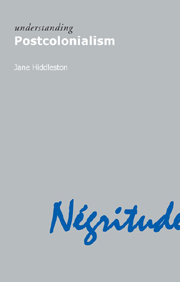Book contents
- Frontmatter
- Contents
- Acknowledgements
- 1 Introduction
- 2 Fanon and Sartre: colonial Manichaeism and the call to arms
- 3 Decolonization, community, nationalism: Gandhi, Nandy and the Subaltern Studies Collective
- 4 Foucault and Said: colonial discourse and Orientalism
- 5 Derrida and Bhabha: self, other and postcolonial ethics
- 6 Khatibi and Glissant: postcolonial ethics and the return to place
- 7 Ethics with politics? Spivak, Mudimbe, Mbembe
- 8 Conclusion: neocolonialism and the future of the discipline
- Questions for discussion and revision
- Guide to further reading
- Bibliography
- Index
2 - Fanon and Sartre: colonial Manichaeism and the call to arms
- Frontmatter
- Contents
- Acknowledgements
- 1 Introduction
- 2 Fanon and Sartre: colonial Manichaeism and the call to arms
- 3 Decolonization, community, nationalism: Gandhi, Nandy and the Subaltern Studies Collective
- 4 Foucault and Said: colonial discourse and Orientalism
- 5 Derrida and Bhabha: self, other and postcolonial ethics
- 6 Khatibi and Glissant: postcolonial ethics and the return to place
- 7 Ethics with politics? Spivak, Mudimbe, Mbembe
- 8 Conclusion: neocolonialism and the future of the discipline
- Questions for discussion and revision
- Guide to further reading
- Bibliography
- Index
Summary
Frantz Fanon is undoubtedly one of the most significant and influential of anti-colonial revolutionary thinkers. Born in Fort-de-France, Martinique in 1925 to a middle-class family, he grew up thinking of himself as French. He was educated in a French school and, before finishing his education, fought for France in the Second World War. Even when serving his country, however, Fanon experienced racism from his French allies, and he criticizes the caste system within the army, whereby whites were positioned at the top, with the Senegalese, the first to be sent into battle, at the bottom. After the end of the war, Fanon went to study psychiatry in Lyon, and published Black Skin, White Masks in 1952. Disillusioned with metropolitan culture, he denounces the Manichaean divisions of the colonial system and rails against the rigid classification of the “negro” as inferior and “other”. After finishing medical school, Fanon took a position at the Blida-Joinville psychiatric hospital in Algiers, where he began to investigate culturally sensitive approaches to madness. A year after he arrived, however, the Algerian War of Independence began, and Fanon quickly found himself caught up in the revolutionary struggle. Treating torture victims and those with psychological illnesses related to the violence, he witnessed at first hand the mental scarring caused by the conflict and began to speak out against its horrors. When the increasing intensity of the violence made practising psychiatry difficult, he resigned his position, left Algeria and worked for the National Liberation Front openly from his exiled position in Tunis.
- Type
- Chapter
- Information
- Understanding Postcolonialism , pp. 25 - 53Publisher: Acumen PublishingPrint publication year: 2009



